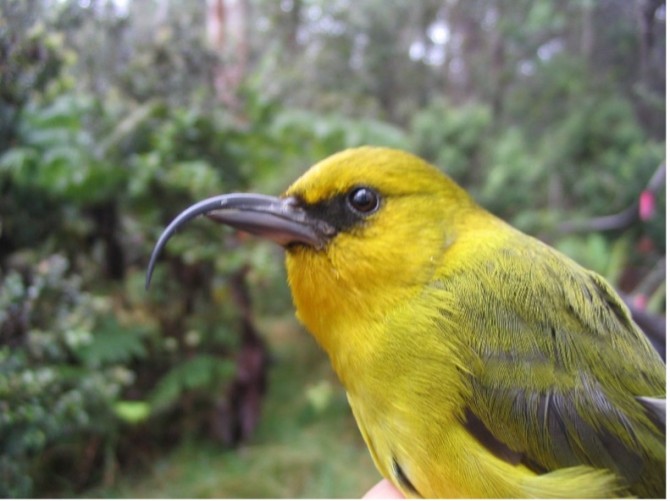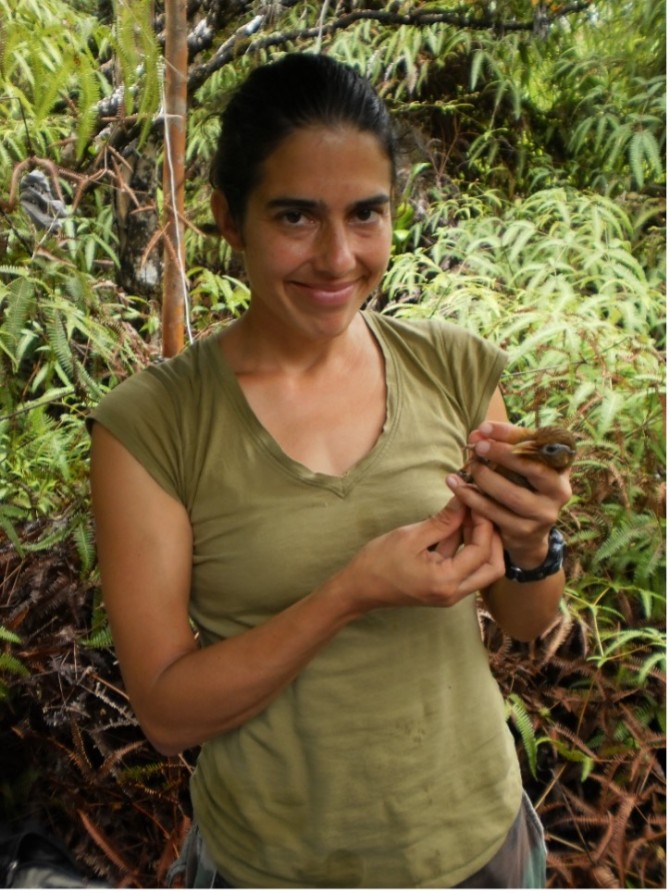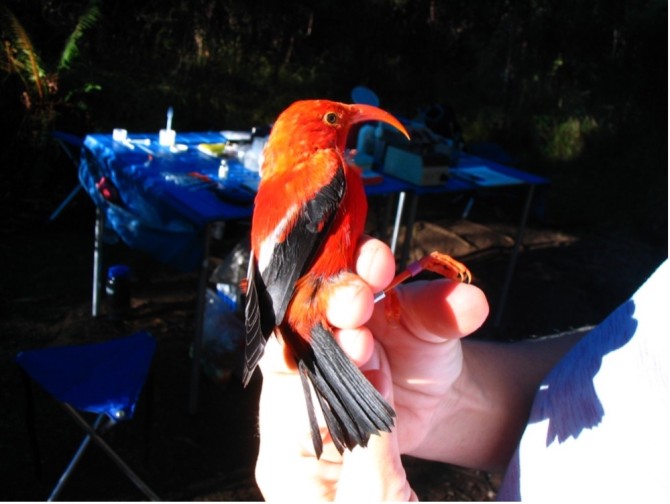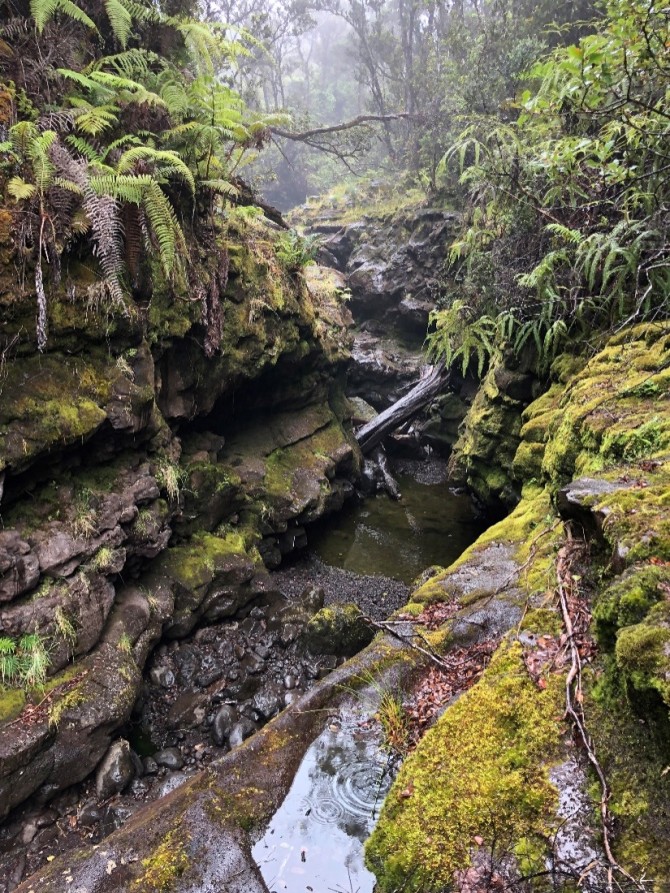News directly from Cornell's colleges and centers
Postdoctoral fellow works to save endangered Hawaiian birds from mosquito menace
As the climate warms, disease-transmitting mosquitoes are invading the last strongholds for native birds in Hawai’i’s upper elevation forests, which were once too cool for mosquito or malaria development. On the island of Kaua‘i, six native bird species recently experienced collapses coinciding with a sharp increase in mosquitoes and malaria. Moreover, eight of the 23 U.S. species declared officially extinct on Sept. 29 by the U.S. Fish and wildlife Service were Hawaiian birds.
Dr. Katherine McClure, quantitative disease ecologist and 2019-2021 postdoctoral fellow with the Cornell Atkinson Center for Sustainability and the Cornell Wildlife Health Center, is working to save Hawai’i’s native bird populations from avian malaria, specifically the Hawaiian honeycreepers.
“Honeycreepers are a spectacular endemic bird taxa,” McClure said. “Because of the warming climate, however, the invasive southern house mosquito is spreading farther into the habitat of these highly endangered birds. Hawaiian honeycreepers are highly susceptible to avian malaria and the southern house mosquito is an efficient vector of this virulent disease.”
As a postdoctoral fellow, McClure worked with faculty mentor Steve Osofsky, D.V.M. ’89, the Jay Hyman Professor of Wildlife Health & Health Policy and director of the Cornell Wildlife Health Center, on novel mosquito control techniques — notably the incompatible insect technique (IIT).
The IIT strategy will use Wolbachia, a naturally-occurring, non-genetically modified, endosymbiotic bacteria, to suppress mosquito populations in native forest bird habitats in Hawai‘i. Once infected with the bacteria, the male mosquitoes will be rendered reproductively incompatible with wild females. Through repeated mass releases, population-level birth control for mosquitoes will cause their populations to crash and thus eliminate local avian malaria transmission.
“To save these highly imperiled native birds, the seemingly intractable problem of mosquito-borne disease transmission must be addressed at a landscape scale across the Hawaiian Islands,” McClure said.
McClure is working with a multi-agency consortium called Birds, Not Mosquitoes, to advance the IIT program. The consortium encompasses federal, state, university and non-profit partners, including the American Bird Conservancy. McClure and partners at Birds, Not Mosquitoes are developing the research tools, operational capacity, funding sources, permitting and community engagement strategies required to advance this conservation effort in Hawai‘i.
McClure used computational models to simulate population dynamics relating to a range of scenarios for mass releases of mosquitoes to estimate optimal release parameters. Her results suggest that frequent applications at sufficiently high numbers will significantly reduce mosquito populations across realistic gradients of temperature. These models support operational and budgetary planning for Wolbachia-transinfected mosquito releases, and are a key tool for testing release strategies in advance of on-the-ground mosquito control efforts.
When McClure began her two-year fellowship in 2019, her research focused on the numbers aspect of monitoring and controlling mosquito populations. “I quickly discovered that there are many other skills required for effective collaboration to achieve real-world conservation impact beyond traditional academic skills and mindsets,” McClure said. While at Cornell, McClure participated in the Cornell Atkinson Center for Sustainability and Environmental Defense Fund’s Sustainability Leadership Program, which provided workshops and trainings in interdisciplinary collaboration, science communication and career development, and says she is now inspired by a collaborative vision of leadership that prioritizes listening and respect.
“The Cornell Atkinson postdoctoral fellowship program, along with fantastic mentorship at the Cornell Wildlife Health Center, helped provide me with a new set of tools to help translate ideas and techniques from public health into effective wildlife conservation action,” McClure said.
McClure concluded her postdoctoral fellowship this past month and plans to implement these skills in her new position as a quantitative ecologist with the Hawaiʻi Cooperative Studies Unit at the University of Hawaiʻi at Hilo, and with the U.S. Geological Survey Pacific Island Ecosystem Research Center on the island of Hawaiʻi. Her work there will focus on the analysis of mosquito and avian malaria data to inform avian conservation efforts and to predict mosquito invasion probability via streams into high elevation forests in Hakalau National Wildlife Refuge under climate change scenarios.
“We couldn’t be more proud in terms of all that Katherine has accomplished during her fellowship,” Osofsky said. “We look forward to ongoing collaborative opportunities to secure a future for wild nature, with Katherine as well as with colleagues at Cornell Atkinson.”
This postdoctoral fellowship was funded by the Cornell Atkinson Center for Sustainability, in partnership with the Cornell Wildlife Health Center and Birds, Not Mosquitoes.
Media Contact
Get Cornell news delivered right to your inbox.
Subscribe




